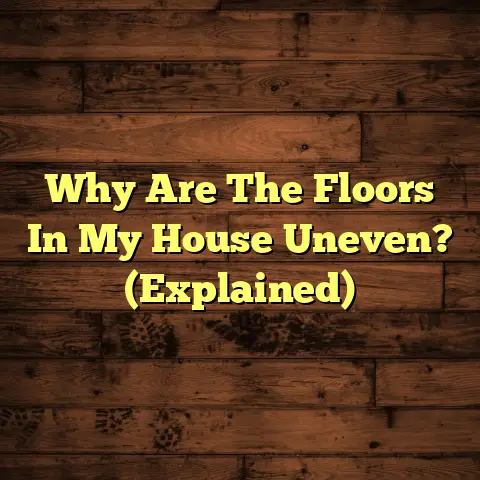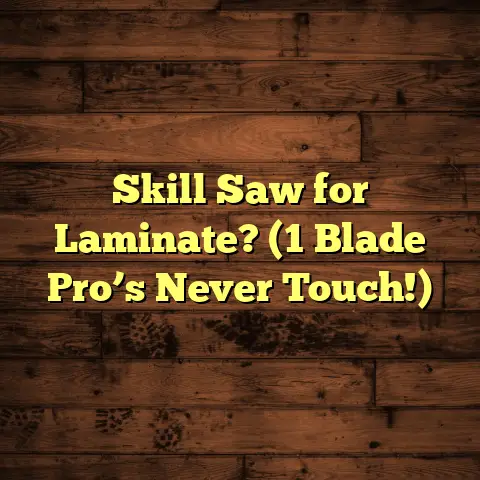Squeaky Hardwood Shoes? (8 Causes Explained!)
In today’s world, we’re not just thinking about how our homes look now, but how they’ll hold up years down the line.
That’s why future-proofing your flooring is so important!
Hardwood is a classic choice, known for its elegance and durability.
But let’s be real – who hasn’t been annoyed by squeaky shoes on a hardwood floor?
It might seem like a small thing, but understanding why those squeaks happen is key to protecting your investment and keeping your home comfortable.
In this article, I’ll break down the eight main reasons why your hardwood floors might be squeaking under your shoes.
We’ll dive deep into the causes and what you can do about it.
Let’s get started!
Section 1: Understanding the Basics
of Hardwood Flooring
1.1 Overview of Hardwood Flooring
So, what is hardwood flooring, exactly?
Basically, we’re talking about flooring made from a single piece of wood, milled from a hardwood tree.
Think oak, maple, walnut, cherry – the classics.
Then, there’s engineered hardwood, which is made of layers of wood with a hardwood veneer on top.
Both have their pros and cons.
Solid hardwood can be refinished multiple times, giving it a super long lifespan.
Engineered hardwood is more stable in humid environments, making it a great option for basements or coastal areas.
Benefits of Hardwood Flooring:
- Durability: Hardwood can last for decades with proper care.
- Aesthetic Appeal: It adds warmth and elegance to any room.
- Increased Home Value: Hardwood is a major selling point.
- Better Air Quality: Unlike some carpets, it doesn’t trap allergens.
I’ve seen firsthand how a well-maintained hardwood floor can transform a home.
It’s an investment that truly pays off!
1.2 The Importance of Proper Installation
Okay, let’s talk installation.
This is huge.
A bad install can lead to problems down the road, including – you guessed it – squeaks!
A properly installed floor is securely fastened to the subfloor, with the right expansion gaps around the edges.
This allows the wood to breathe and move naturally with changes in humidity.
I always tell my clients: don’t skimp on the installation.
Hire a qualified professional who knows their stuff.
It’ll save you headaches (and squeaks!) in the long run.
Think of it this way:
- A solid foundation prevents cracks in a building.
- A proper install prevents squeaks in your floor.
Section 2: The Anatomy of a Squeak
2.1 What Causes Squeaks in Hardwood Flooring?
Alright, let’s get scientific for a minute. What actually causes that annoying squeak?
It’s all about friction.
When two surfaces rub together, they create vibrations, which we hear as sound.
In the case of hardwood floors, the squeak usually comes from the floorboards rubbing against each other, the subfloor, or the fasteners (nails or staples).
Think of it like this:
- Pressure + Movement = Squeak
The more pressure and movement, the louder the squeak.
2.2 The Role of Shoes in Creating Squeaks
Now, why do shoes make the squeak worse?
Different shoes have different soles and heels, which create varying amounts of pressure and friction on the floor.
High heels, for example, concentrate a lot of weight on a small area, which can really amplify the squeak.
Rubber soles can also contribute to the problem by creating more friction than leather or other materials.
I’ve noticed that certain types of athletic shoes with aggressive treads can be particularly squeaky.
It’s all about the interaction between the shoe and the floor surface.
Section 3: Eight Causes of
Squeaky Hardwood Shoes
Okay, let’s dive into the eight main culprits behind those squeaky shoes!
3.1 Cause 1: Inadequate Fastening
This is a big one.
If the floorboards aren’t properly secured to the subfloor, they’ll move around and rub against each other, causing squeaks.
Insufficient nails or staples, or using the wrong type of fasteners, can all lead to this problem.
I’ve seen floors where the installer was clearly trying to save a few bucks on fasteners, and it always comes back to bite them (and the homeowner) later.
Pro Tip: Make sure your installer uses the correct type and amount of fasteners, spaced properly according to the manufacturer’s instructions.
3.2 Cause 2: Humidity and Moisture Levels
Wood is a natural material, and it expands and contracts with changes in humidity.
If the humidity levels in your home fluctuate wildly, your hardwood floor can start to buckle or gap, creating opportunities for squeaks.
High humidity causes the wood to swell, while low humidity causes it to shrink.
This constant movement can loosen the fasteners and create friction.
Here’s a statistic:
- According to the National Wood Flooring Association (NWFA), the ideal relative humidity for hardwood floors is between 30% and 50%.
I recommend using a dehumidifier or humidifier to maintain consistent humidity levels in your home.
3.3 Cause 3: Subfloor Issues
The subfloor is the foundation of your hardwood floor.
If it’s uneven, damaged, or not properly installed, it can cause all sorts of problems, including squeaks.
A bouncy or unstable subfloor will allow the floorboards to move excessively, leading to friction and noise.
I’ve seen cases where the subfloor was made of particleboard, which is particularly susceptible to moisture damage and can crumble over time.
Common Subfloor Issues:
- Unevenness
- Loose or damaged plywood
- Inadequate thickness
- Moisture damage
Before installing hardwood, make sure your subfloor is in good condition.
If necessary, repair or replace it to ensure a solid foundation.
3.4 Cause 4: Wear and Tear Over Time
Like anything else, hardwood floors deteriorate over time.
The constant foot traffic, furniture movement, and general wear and tear can loosen the fasteners, wear down the finish, and create gaps between the boards.
Older floors are more likely to squeak simply because they’ve been subjected to years of use.
Regular maintenance, like refinishing and applying a fresh coat of sealant, can help extend the life of your floor and minimize squeaks.
3.5 Cause 5: Improperly Sized Wood Planks
Using wood planks that are too thin or too wide for the application can also contribute to squeaking.
Thin planks may not be strong enough to support the weight and pressure, while wide planks are more prone to expansion and contraction.
I’ve seen instances where homeowners tried to save money by using cheaper, thinner planks, only to regret it later when the floor started squeaking and buckling.
Rule of Thumb:
- Consult with a flooring professional to determine the appropriate plank size for your specific needs and conditions.
3.6 Cause 6: Loose Floorboards
This one’s pretty straightforward.
If a floorboard is loose, it’s going to move around and squeak.
Loose boards can be caused by a variety of factors, including inadequate fastening, moisture damage, or simply wear and tear.
Sometimes, you can identify a loose board by stepping on it and feeling it move or shift.
Quick Fix:
- If you find a loose board, try tapping it back into place with a rubber mallet.
- You may also need to add some construction adhesive or drive in a few more nails to secure it.
3.7 Cause 7: Structural Shifts in the Home
Sometimes, the problem isn’t with the floor itself, but with the structure of the house.
Settling or movement in the foundation can cause the floor to become uneven or misaligned, leading to squeaks.
This is more common in older homes or homes built on unstable soil.
Signs of Structural Issues:
- Cracks in the walls or ceilings
- Doors or windows that stick
- Sloping floors
If you suspect structural issues, it’s important to consult with a qualified contractor or structural engineer.
3.8 Cause 8: Shoe Design and Materials
Believe it or not, the shoes you wear can also contribute to squeaky floors.
As we discussed earlier, certain shoe designs and materials create more friction and pressure on the floor, amplifying the sound.
High heels, rubber soles, and shoes with aggressive treads are all common culprits.
Experiment:
- Try walking on your hardwood floor with different types of shoes and see which ones squeak the most.
You might be surprised at the difference!
Section 4: The Impact of Squeaky
Hardwood Shoes on Homeowners
4.1 Psychological Effects of Squeaking
Let’s be honest, squeaky floors are annoying.
That constant, repetitive noise can be incredibly distracting and irritating, especially if you’re trying to relax or concentrate.
It can also create a feeling of unease or anxiety, as if something is wrong with your home.
I’ve had clients tell me that their squeaky floors were driving them crazy!
It’s a seemingly small issue that can have a big impact on your overall well-being.
4.2 The Perception of Home Value
Squeaky floors can also affect the perceived value of your home.
Potential buyers may see squeaks as a sign of neglect or underlying problems, which can make them less likely to make an offer or negotiate a lower price.
In a competitive real estate market, even minor issues can make a difference.
First Impressions Matter:
- A well-maintained hardwood floor creates a positive first impression and can increase the appeal of your home.
Section 5: Addressing Squeaky
Hardwood Shoes
5.1 Prevention Strategies
The best way to deal with squeaky floors is to prevent them from happening in the first place.
Here are a few key prevention strategies:
- Proper Installation: As we’ve discussed, a proper install is crucial.
- Climate Control: Maintain consistent humidity levels in your home.
- Subfloor Preparation: Ensure your subfloor is in good condition.
- Quality Materials: Use high-quality wood planks and fasteners.
5.2 Maintenance Practices
Regular maintenance can also help keep your hardwood floors in optimal condition and minimize squeaks.
Here are a few maintenance practices to follow:
- Regular Cleaning: Sweep or vacuum regularly to remove dirt and debris.
- Use Proper Cleaning Products: Avoid harsh chemicals that can damage the finish.
- Apply a Fresh Coat of Sealant: Reapply sealant every few years to protect the wood.
- Refinish When Necessary: Refinishing can restore the beauty of your floor and address any minor issues.
Conclusion: Emphasizing the
Importance of Understanding
Squeaky Hardwood Shoes
So, there you have it – eight causes of squeaky hardwood shoes and what you can do about them.
While squeaks may seem like a minor annoyance, understanding the underlying causes is crucial for preserving the beauty and integrity of your flooring.
By being aware of the factors that contribute to squeaks, homeowners can take proactive measures to ensure their hardwood floors remain a source of pride and comfort for years to come.
Embracing knowledge about flooring maintenance is a key step in future-proofing this important investment in your home.
I hope this article has been helpful!
Remember, I’m always here to answer your flooring questions.
Happy home improving!





